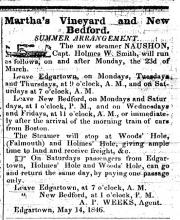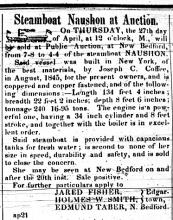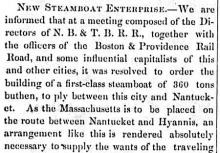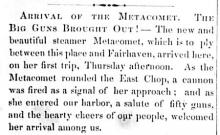Only the signature of Governor Furcolo now remains to turn into law the bill setting up a new Steamship Authority with three members, locally appointed, to represent the Vineyard Nantucket, and Falmouth, and with final emancipation from New Bedford. State House observers and others believe that the governor will sign the measure promptly, although the strong political pressure from New Bedford is not discounted.
The Senate bill, embodying the program of the original Sylvia-Mooney bill and perfecting its aims and provisions in the light of all the constitutional and other questions raised in the past months, was enacted by the House on Tuesday and by the Senate yesterday. The Senate action was by voice vote without debate.
The bill had received approval by the Senate last week, and was returned to the House on Monday, passing its three readings by overwhelming majorities. The House refused by 55 to 15 to refer it to the ways and means committee. By a standing vote, 47 to 13, a motion to kill the bill by referring it to the next annual session was defeated. And another standing vote, 49 to 12, rejected an amendment to resubstitute the original Sylvia-Mooney bill, thus inviting an appeal to the courts by the bill’s New Bedford opponents.
The New England Newspaper Service report of the initial proceedings in the Senate last week is as follows:
Senators in Debate
Preceding the great victory for the people of the Islands there was a rather lengthy debate between Republican Senators Howard W. Young of North Dartmouth and Edward C. Stone of Barnstable, the measure’s major opponent and proponent, respectively.
The former repeated his previous arguments that New Bedford would still be liable for the Authority’s bonded indebtedness and for forty per cent of the deficit during the time it remained as a part of the Authority.
Senator Stone maintained that his opponent’s arguments had no basis in fact, saying, “I dislike seeing a brilliant lawyer make statements that are not true.”
The Commonwealth would have sole responsibility for the indebtedness of the new Authority, Senator Stone insisted, and said it was only fair that New Bedford pay its share of the deficit up to Jan. 1 of next year, when the old Authority of which it was still a member will go out of existence.
The New Bedford senator introduced a parliamentary question, asserting that if it were true that the Commonwealth was responsible for the indebtedness, a two-thirds vote would be required to decide the issue at stake. Sen. Maurice A. Donahue (D) of Holyoke, who had the rostrum, ruled that if Young’s point were proven true, the two-thirds vote would be necessary only when the measure reached the enactment stage.
On the question of passing the bill to be engrossed, Senators voting “yes” included Beades of Boston, Benoit of Southbridge, Burkhardt of Westfield, Cramer of Williamstown, Cutler of Needham, Farnam of Medford, Graham of Hamilton, Hays of Waltham, Hennigan of Boston, Hogan of Lynn, Keith of Brockton, Lamson of Malden, Lappin of Dracut, Lundgren of Worcester, Madden of Lexingyon, Mahar of Orange, McCann of Cambridge, Olson of Ashland, Powers of Boston, Rurak of Haverhill, Silvano of Brookline, Stanton of Fitchburg, Stone of Barnstable and Zarod of Springfield.
Voting “no” were Senators Corbett of Somerville, Donahue of Holyoke, Fonseca of Fall River, LoPresti of Boston, Parker of Tauton, Wall of Lawrence and Young of North Dartmouth.
In the debate in the House on Monday, Rep. Joseph A. Sylvia and Rep. Robert F, Mooney had the help of Rep. Harry B. Albro of Harwich and Rep. Allan F. Jones of Barnstable in countering the attacks of New Bedford legislators.
Sylvia Countered Objection
When it was contended that the substitute bill should be sent to committee, Representative Sylvia declared that it contained nothing not already considered by the ways and means committee. He insisted that since the original bill left the House last June there had been ample time for consideration.
Representative Jones said that New Bedford would not suffer under the bill because “there is a perfectly good highway to Woods Hole where 99 per cent of all freight is shipped.” He declared that shipment by way of Woods Hole is economical, and that New Bedford put no emergency craft into operation during the strike because there was no need.
Representative Mooney declared that the New Bedford tactics were dilatory, and that “there has been nothing but delay and postponement.”
The Island case was pressed by Representatives Sylvia and Mooney, and the line was held.











Comments